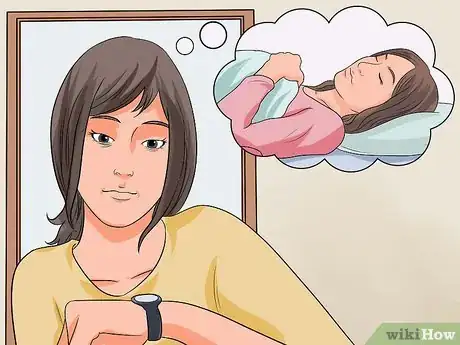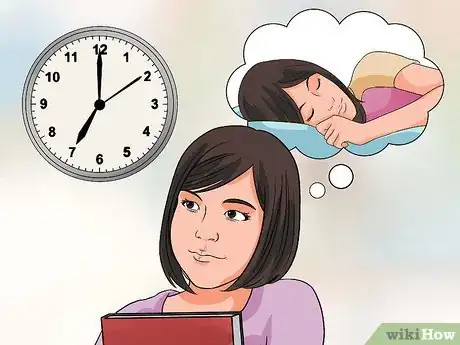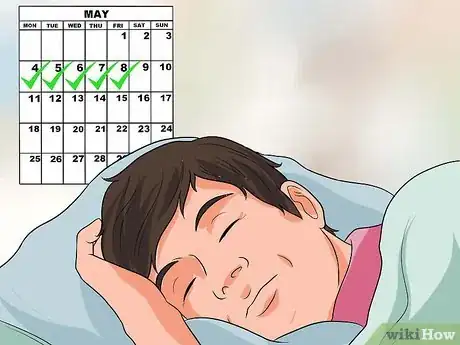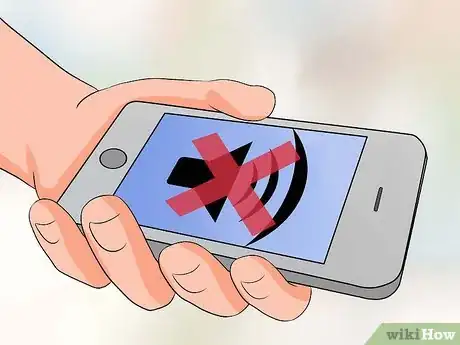This article was co-authored by Brett Baughman. Brett Baughman is a Business & Life Coach, as well as the Founder of The Brett Baughman Companies, Inc., and the renowned Action Mastery retreats. With over 20 years of experience, his specialty is helping high-performing executives and entrepreneurs to advance to the next level of success. He earned his Bachelor’s Degree from Illinois State University and was mentored by Tad James. During his work at the Tad James Company, he earned his certifications as a Master NLP Coach (Neuro-Linguistic Programming), a Certified Master Hypnotherapist, an NLP Trainer & Master Practitioner, and a Time Line Therapy Trainer & Master Practitioner. He’s also been voted the Top Coach to work with by Apple News.
There are 11 references cited in this article, which can be found at the bottom of the page.
wikiHow marks an article as reader-approved once it receives enough positive feedback. In this case, several readers have written to tell us that this article was helpful to them, earning it our reader-approved status.
This article has been viewed 275,200 times.
Working third shift can be hard to adjust to. The main difficulty is with changing your internal clock. Thankfully there are some techniques you can use to help making the night shift more comfortable to work.
Steps
Taking General Steps
-
1Exercise and eat healthy. Exercising before work can help boost energy levels and help keep you healthy.[1] Finding and planning a healthy diet plan will also help keep you alert and well.
- Don't exercise before sleep, as it boosts energy levels.
- Don't eat right before you go to sleep.
- Plan your meal times.
- Eat a light snack if you need quick energy at night. Whole grains are a good option.[2]
- Try to avoid sugary snacks as they may give you a boost, but then leave you even more tired after the effects subside.
-
2Adjust your schedule. Keep in mind that you will still have responsibilities and relationships to maintain, some of which might require your attention during the day. Create your schedule so that you still have time for other important aspects of your life.
- Make time to spend with family and friends.
- Make sure you leave enough time for errands, such as grocery shopping or going to the bank.
- Take note of which stores and services are open only during the day and which are open at night.
- If you have trouble scheduling something, ask a friend or family to help take care of these day time tasks.
- There is no best schedule, you will have to find what works for you.
- Being disciplined in your new schedule and sticking with it is key! The unconscious mind works best when you understand what's going to happen as a routine.
Advertisement -
3Try using stimulants and depressants.[3] Drink stimulants such as coffee or tea with caffeine before work. This can help to wake you up and improve mental focus. When you return home, relax and have a tea that helps you to sleep such as lavender or chamomile[4] .
- Stop taking caffeine at least six hours before sleep [5]
- Ask your doctor before using any pharmaceutical sleep aids
-
4Be aware of your mental and physical health. The night shift has been known to cause some health problems for those who work it. If you notice any of the following symptoms or issues, consider seeing a doctor or making a change in your work/life scheduling:
- Reduction of quality or amount of sleep.
- Constant fatigue
- Anxiety or depression
-
5Work with your family. Let your family know about your needs. Inform them of your sleeping schedule and ask them to please not disturb you during those hours. Don't forget, you also need quality time with friends and family, and should schedule that time into your day.
- Ask them to please be as quiet as they can during the time you are sleeping.
- Always set aside time spend with family and friends.
- Being social can help combat the effects of loneliness that can come with a night shift.
Finding a Sleep Balance
-
1Learn about your circadian rhythm. The circadian rhythm refers to both physical and mental changes that occur over a twenty four hour period. The main force behind the rhythm is exposure to light or dark. This rhythm effects your sleep-wake schedule.[6]
- Exposure to light will send the message to your body that it's time to be active.
- When your optic nerve is exposed to low or no light, your body produces melatonin, which is responsible for making you feel the need to sleep.
-
2Sleep as soon as you get home from work. Don't stay up any later than you must after work. Go home immediately and sleep. Staying up any later will start to shift your circadian rhythm in an unbalanced direction.
- Take the shortest route to work. [7]
- Stay alert on your drive home.
- If you feel too drowsy to drive, pull over.
-
3Keep your sleep consistent. Whatever sleep schedule you find works best for you, stick to it. Regular sleep schedules over time will help establish a natural rhythm. This rhythm will help you sleep easier and allow you to be better rested.[8]
- If you do get off schedule, try to get back on it as soon as you can.
- Ease into any new sleep schedule slowly if possible.
- Keep your work night sleep schedule, even on nights off.
- Changing your schedule can lower the amount of sleep you get overall.
-
4Get a good amount of sleep. Your sleep should be lengthy, deep, and restful. It can be hard to fall asleep and stay asleep, so monitor how many hours of sleep you get and the quality of that sleep.
- Keep a sleep journal to log the length and quality of your sleep.
- Though eight hours a night are recommended, every person is different.
- Pay attention to how you feel, get more sleep if you think you need it.
- Even though you work nights, you still need your normal amount of sleep.
-
5Make changes gradually. If possible, spend a few nights getting used to any new schedules of sleep. Ideally, you should keep the same sleep schedule consistently. Not all shifts allow for such regularity however, so any changes that do arise should be eased into.
- If you know a change is coming, spend a few nights before adjusting.
- If you know a string of night shifts are coming up, stay up later than normal a few nights before.[9]
- Gradually working into a new shift schedule will make the change easier and allow you to perform better at work.
Managing Light and Sound Exposure
-
1Keep your bedroom dark. Use the heaviest blinds you can to block out all sunlight from your bedroom. Light exposure will send a message to your brain that it's time to be awake. Removing light will help you sleep much better.[10]
- Keep other rooms dark, such as your bathroom, in case you do wake up before you are done sleeping.
-
2Wear sunglasses on your way home. Any light exposure will add to the time it takes your body to fall asleep. Driving home in direct sunlight, without sunglasses, will make it more difficult to sleep as soon as you get home.[11]
- Don't stop to do any errands.
- Take the shortest route home.
-
3Keep your workplace brightly lit. Keeping bright lights on at work will help you remain alert. When your eyes are exposed to such light, it lets your body know its time to be awake. By using bright indoor light, you mimic the light someone who works a day shift is exposed to.
- Avoid any low or gentle lighting, as this may bring on drowsiness.
- UV lights can give you vitamin D, much like natural sunlight does.[12]
-
4Block out noise. While exposure to light my keep you awake, sound can be just as troublesome. You will need to block out any noises that could keep you awake. Try the following methods to keep bothersome noises from waking you:[13]
- Ear plugs
- Noise cancelling headphones
- White noise machine to cover up other sounds.
- Ask family members to be as quiet as they can during your sleeping hours.
- Turn off your phones ringer if possible.
Warnings
- Do not overuse or abuse sleep aids.⧼thumbs_response⧽
- Monitor your health. Working the night-shift can have negative effects on your health.⧼thumbs_response⧽
- If you develop headaches, difficulty thinking, or lack of energy, visit your doctor.[14]⧼thumbs_response⧽
References
- ↑ http://www.mayoclinic.org/healthy-lifestyle/adult-health/expert-answers/shift-work/faq-20057991
- ↑ http://www.mayoclinic.org/healthy-lifestyle/childrens-health/in-depth/childrens-health/art-20044350?pg=1
- ↑ http://www.apa.org/monitor/2011/01/night-work.aspx
- ↑ http://www.ncbi.nlm.nih.gov/pmc/articles/PMC2995283/
- ↑ http://www.uhs.umich.edu/caffeine
- ↑ http://www.nigms.nih.gov/Education/Pages/Factsheet_CircadianRhythms.aspx
- ↑ http://sleepfoundation.org/sleep-topics/shift-work-and-sleep/page/0/1
- ↑ http://www.mayoclinic.org/healthy-lifestyle/adult-health/expert-answers/shift-work/faq-20057991
- ↑ http://sleepcenter.ucla.edu/body.cfm?id=54
About This Article
To prepare yourself for working the night shift, make sure to exercise and eat healthy to boost energy levels and keep you alert. If you’re feeling sluggish before or during work, try some caffeine, but remember to stop consuming caffeinated drinks at least 6 hours before bedtime. Then, try to sleep as soon as you can once you get home to ensure that you get enough rest. If you live with others, inform them of your sleeping schedule, and politely ask them to not disturb you during those hours. To learn how to manage light and sound exposure to get the best daytime sleep, keep reading!















































































Medical Disclaimer
The content of this article is not intended to be a substitute for professional medical advice, examination, diagnosis, or treatment. You should always contact your doctor or other qualified healthcare professional before starting, changing, or stopping any kind of health treatment.
Read More...